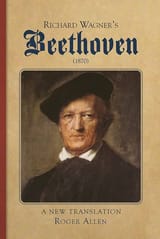Search Results
7/13/2025, 3:03:00 AM
>>24544551
E.T.A Hoffmann's Kreisler novels
Schopenhauer's World as Will and Representation
Wagner's Prose Writings
Nietzsche's The Birth of Tragedy
>Never in the world has art produced anything as joyous as these symphonies in A major and F major, together with all the closely related compositions from the divine period of the Master’s complete deafness. The effect of this on the hearer is precisely this liberation from all guilt just as the after-effect is the feeling of a lost paradise, with which we return to the world of appearance. So these wonderful works preach remorse and repentance in the deepest sense of a divine revelation.
E.T.A Hoffmann's Kreisler novels
Schopenhauer's World as Will and Representation
Wagner's Prose Writings
Nietzsche's The Birth of Tragedy
>Never in the world has art produced anything as joyous as these symphonies in A major and F major, together with all the closely related compositions from the divine period of the Master’s complete deafness. The effect of this on the hearer is precisely this liberation from all guilt just as the after-effect is the feeling of a lost paradise, with which we return to the world of appearance. So these wonderful works preach remorse and repentance in the deepest sense of a divine revelation.
6/30/2025, 8:28:34 PM
>>24509155
What about Music?
>It may certainly seem that our civilisation, to the extent that it fashions the artist in particular, can be given soul anew only out of the spirit of our music, the music which Beethoven freed from the bonds of fashion. In this sense the task of bringing the religion permeating this civilisation to the new, more spiritual civilisation which is perhaps being shaped by this means can evidently be granted only to the German spirit and we ourselves can only understand that spirit correctly if we rid ourselves of every false tendency attributed to it.
>Let everyone see for himself how the whole modern world of appearances which, to his despair, everywhere encloses him on all sides, suddenly vanishes to nothing when he hears just the first bars of one of those divine symphonies. How could we listen to this music with even a modicum of devotion in a concert hall of today (where Turks and Zouaves would certainly feel comfortable!) if the phenomenal environment did not disappear from our sight as mentioned above? In a very real sense, it is the same effect that music has on our whole civilisation: music extinguishes it as daylight extinguishes lamplight.
>Beethoven’s symphonies had already (as it were with non-conceptual sound) stirred in the depths what our thinkers and our poets had only dimly discerned: they understood, just as we do, the new religion, the world-redeeming proclamation of sublime innocence.
What about Music?
>It may certainly seem that our civilisation, to the extent that it fashions the artist in particular, can be given soul anew only out of the spirit of our music, the music which Beethoven freed from the bonds of fashion. In this sense the task of bringing the religion permeating this civilisation to the new, more spiritual civilisation which is perhaps being shaped by this means can evidently be granted only to the German spirit and we ourselves can only understand that spirit correctly if we rid ourselves of every false tendency attributed to it.
>Let everyone see for himself how the whole modern world of appearances which, to his despair, everywhere encloses him on all sides, suddenly vanishes to nothing when he hears just the first bars of one of those divine symphonies. How could we listen to this music with even a modicum of devotion in a concert hall of today (where Turks and Zouaves would certainly feel comfortable!) if the phenomenal environment did not disappear from our sight as mentioned above? In a very real sense, it is the same effect that music has on our whole civilisation: music extinguishes it as daylight extinguishes lamplight.
>Beethoven’s symphonies had already (as it were with non-conceptual sound) stirred in the depths what our thinkers and our poets had only dimly discerned: they understood, just as we do, the new religion, the world-redeeming proclamation of sublime innocence.
Page 1
